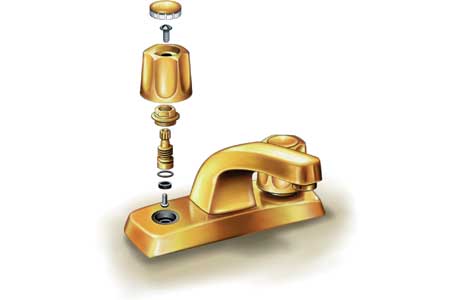
Photo: Paul Perreault
Droplets from a two-handled laundry-room faucet have been
falling with the relentless beat of a metronome in the home of Richard
Trethewey, This Old House's plumbing and heating consultant.
"Most people will ignore a dripping faucet out of fear or ignorance,"
says Richard. If they deal with it at all, it's usually by cranking the handle
so hard they risk tearing a rubber washer or cracking something and making the
leak worse. At his own Second Empire house, it's more the case of the cobbler’s
child whose feet go unshod.
A homeowner with a little wherewithal should be able to finish similarly simple repairs in half an hour. "Fixing a faucet drip won't solve the world's water woes," says Richard. "But it will save the finish on your enamel sink and end your Chinese water torture."
A homeowner with a little wherewithal should be able to finish similarly simple repairs in half an hour. "Fixing a faucet drip won't solve the world's water woes," says Richard. "But it will save the finish on your enamel sink and end your Chinese water torture."

Photo: Paul Perreault
Most leaky compression faucets need new seat washers. Pry
off the decorative cap on the handle, remove the handle screw, pull off the
handle and use a crescent wrench to unscrew the packing nut. After unscrewing
the stem, remove and replace the seat washer held in place by a brass screw.
Pop the stem out of the packing nut and replace the O-ring, the culprit for
leaky handles. Reassemble the faucet and tighten the packing nut.
If your faucet continues to leak, the seat may be pitted. Remove the stem and grind smooth the valve seat with a valve-seat dresser, a tool you temporarily screw down into the faucet.
If your faucet continues to leak, the seat may be pitted. Remove the stem and grind smooth the valve seat with a valve-seat dresser, a tool you temporarily screw down into the faucet.
source: This Old House Magazine
by Richard Weir
by Richard Weir

No comments:
Post a Comment